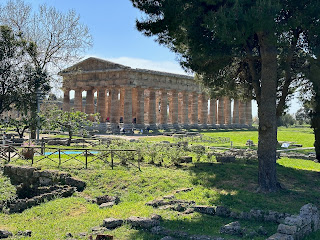"'We're not Christians," they say. "Christ stopped short of here, at Eboli.'"
'They' are the peasants of Gagliano, superstitious and pagan and so not entirely Christian.
In 1935, Carlo Levi was banished to a small hilltop town, Gagliano, in Basilicata, the deep south of Italy. Levi had been a member of the anti-Fascist organization Giustizia e Libertá [Justice and Liberty] and an opponent of the war against Ethiopia. Before Gagliano, he'd served a spell in solitary confinement and then an earlier period of internal exile in Grassano. The book begins as he's being transferred from Grassano to Gagliano.
Levi was born to a culturally Jewish and well-to-do family in Turin, in the north of Italy. He'd studied for a medical degree and his older sister Luisa became a famous neuropsychologist. But Levi himself, though he had qualified as a doctor, quit practising, and began to paint. He spent time in Paris in the 20s (he's born in 1902) painting, but on his return to Italy, had been caught up in the politics of the era.
The book is a pretty fascinating look at what the life of an isolated peasant culture was in the south of Italy in the 30s. Levi suggests--and it seems so--it hadn't changed all that much in centuries. Levi spends about a year there, grows to like the peasants he meets but remains unromantic about them. There's an amnesty after Italy wins its war against Ethiopia, and Levi is freed. He vows to come back to the south of Italy when he can, but doesn't, at least until his body is buried in Gagliano. The book came out in Italian in 1945, and made a stir among Italians who didn't have any clue about what was going on in the rural peasant south. Highly recommended.
I had a few more insightful things I meant to say, but, oh well, it's been three weeks since I finished it. I read it now because we were going to the south of Italy and I thought, it's time! But we didn't get to Gagliano, nor even to Eboli. (We stopped well short.) The farthest south we got was Paestum:
 |
| Temple to Hera (probably; it used to be thought Poseidon's) |
Also south of Naples is the Amalfi coast. We walked to Ravello (a hill town hangout for Virginia Woolf and D. H. Lawrence and Richard Wagner) from Minori, a town on the coast. My phone registered 74 flights of stairs that day. Three-quarters of the Empire State Building!
 | |
| The view from the Villa Rufalo in Ravello. The brochure said everybody takes this photo & I did, too. |
I first read Virgil at a formative age. I wanted to see Phlegraean Fields, the purported entrance to Hades and Hephaestus' workshop, near Naples.
 |
| Lunch by Roman ruins in Pozzuoli, our first supposed temple of Serape, but really just a market. |
We arrived at and then flew out of Rome. There are always things to see there, of course, and we didn't see them all. One of them was Hadrian's Villa, about 30 km east of Rome:
 |
| The building on the island was Hadrian's mancave. |
 |
| Our second so-called temple of Serape |
When you're king of the world and you've just come back with a boatload of plunder from Romania, you get to build this sort of thing. This so-called temple also wasn't, but apparently was just meant for (very) fancy picnics. We'd intended to see the villa on our visit ten years ago, but then ended up spending the entire day at the nearby (and also very cool) Villa d'Este. But now having read The Memoirs of Hadrian, I wanted to see it.
I probably ought to have read Christ Stopped at Eboli in Italian, but didn't. But look what my library was able to deliver:
It's nice to travel, but it's also good to be back!


Your trip sounds amazing! I'm glad you had such a good time. And your photos are beautiful. Thanks for sharing. :D
ReplyDeleteThanks! It definitely was fun.
DeleteWhat a wonderful journey you've had! thanks for sharing your photos with us.
ReplyDeleteCan you read in Italian? Not that one must, in order to appreciate a book published in another language that one's read in translation! I love browsing in the Riverdale branch: their Chinese literature section is fairly near the front with the new books and bestsellers.
It was a pretty great trip.
DeleteI've had several years of Italian (and a whole of Latin) and can read Italian. I should read more & keep it up better than I do, though.
Chinese, though! I don't think I could even browse in Chinese. I learned the Cyrillic alphabet well enough I can spell things out, but can't read any of the languages.